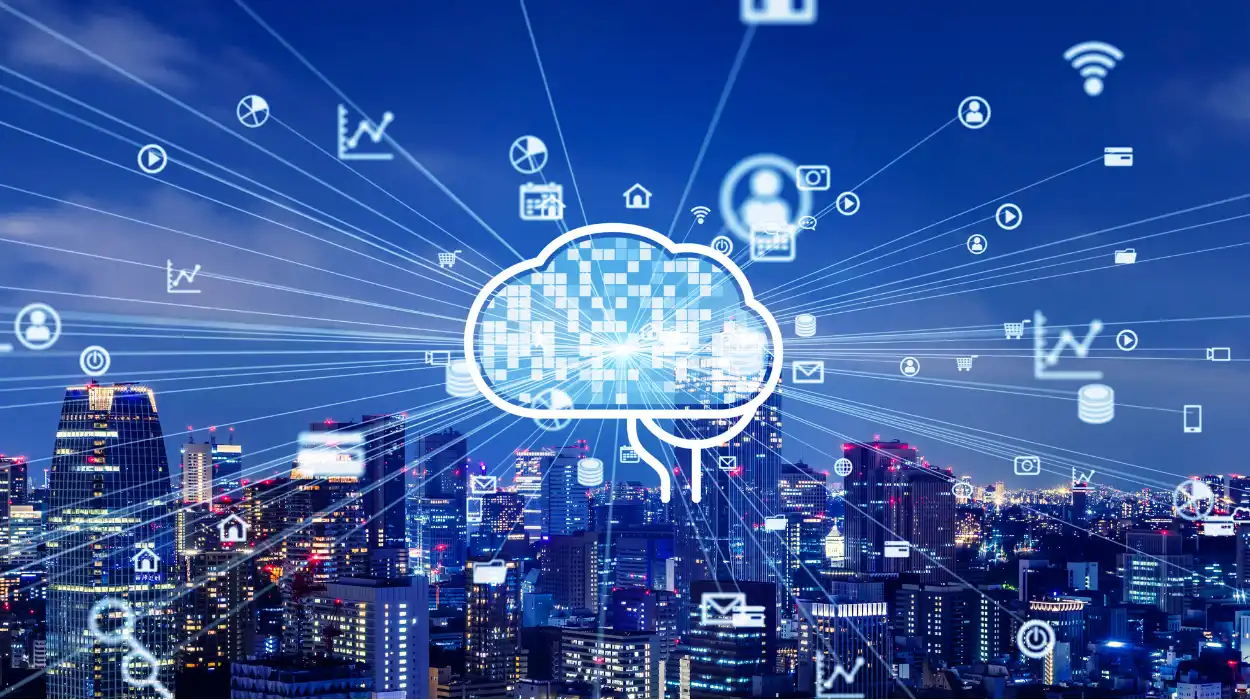The rapid urbanization of the 21st century presents both opportunities and challenges. Cities must adapt to growing populations, environmental concerns, and demands for efficiency. This is where AI in smart cities comes into play. By integrating artificial intelligence in urban planning and infrastructure, cities are becoming more sustainable, efficient, and citizen-centric.
This blog explores how AI in smart cities is shaping urban planning and infrastructure, the technologies driving this transformation, and the benefits of AI-driven urban development. We also examine challenges and provide insights into the future of artificial intelligence in urban development.
Understanding AI in Smart Cities
AI in smart cities refers to the application of artificial intelligence technologies to enhance city management, optimize resources, and improve quality of life. From smart city infrastructure AI to AI for sustainable cities, machine learning and data-driven solutions are reshaping how urban centers function.
Core Functions of AI in Smart Cities
- Data analysis at scale – Gathering and interpreting data from sensors, IoT devices, and city systems.
- Predictive modeling – Anticipating traffic, energy demand, and public service needs.
- Automation – Streamlining city operations like waste management and traffic control.
These elements make AI-powered city infrastructure both efficient and sustainable.
Artificial Intelligence in Urban Planning
Urban planning traditionally involves long-term forecasts and static models. However, artificial intelligence in urban planning introduces real-time adaptability and precision.
Applications of AI in Urban Planning
- Land use optimization – Predicting the best allocation for housing, industry, and green spaces.
- Environmental planning – Using AI to track pollution, water usage, and sustainability efforts.
- Traffic and mobility solutions – Designing road networks and public transport routes with AI data.
This level of innovation drives digital transformation in urban planning, making cities more adaptable to evolving needs.
Smart City Infrastructure AI
Smart city infrastructure AI refers to applying artificial intelligence in utilities, buildings, and public services to enhance urban living standards.
Key Infrastructure Applications
- Energy grids – AI-driven smart grids that balance supply and demand.
- Waste management – Predictive systems for collection schedules and recycling optimization.
- Smart buildings – Energy-efficient building management through AI automation.
These developments highlight the role of AI in smart city innovation, bridging technology and sustainability.
AI-Driven Urban Development
AI-driven urban development focuses on designing smarter, sustainable, and more resilient cities. By integrating AI for city management, planners ensure efficiency in public services and infrastructure growth.
Benefits of AI-Driven Urban Development
- Efficiency – Automated operations reduce human error and cost.
- Sustainability – Optimized resource use lowers environmental impact.
- Resilience – AI prepares cities for emergencies, from natural disasters to infrastructure failures.
This is central to AI for sustainable cities, creating urban environments that meet the demands of modern life while protecting future generations.
AI for Sustainable Cities
Sustainability is at the core of modern development, and AI for sustainable cities ensures that growth aligns with environmental goals.
Sustainable AI Applications
- Energy optimization – AI improves renewable energy integration.
- Water conservation – Smart systems track usage and detect leaks.
- Air quality monitoring – AI predicts pollution trends and informs policies.
These solutions reflect the benefits of AI in sustainable urban planning, where technology supports ecological balance and livability.
AI for City Management
Governments and municipalities are increasingly using AI for city management to improve governance and services.
Examples of AI in City Management
- Public safety – AI-enabled surveillance and crime prediction systems.
- Transportation – Smart traffic lights and real-time transit adjustments.
- Citizen engagement – AI-powered chatbots for public inquiries and complaints.
These examples show how AI applications in smart city management and infrastructure directly impact citizen satisfaction and trust.
Digital Transformation in Urban Planning
The digital transformation in urban planning leverages AI to connect planners, stakeholders, and citizens. By digitizing data and models, cities ensure transparency and collaboration.
Benefits of Digital Transformation in Planning
- Data-driven policies – AI insights inform more accurate decision-making.
- Scenario simulations – Planners test urban growth models virtually.
- Inclusive design – Citizen feedback is integrated through digital platforms.
Such transformation accelerates the future of artificial intelligence in urban development, ensuring smarter governance.
Future of Artificial Intelligence in Urban Development
The future of artificial intelligence in urban development is deeply tied to technological advances and policy alignment.
Trends to Watch in 2025 and Beyond
- AI-integrated mobility – Expansion of autonomous transport networks.
- Smart grids and green energy – AI-managed renewable energy ecosystems.
- Urban resilience – AI solutions for climate change adaptation and disaster response.
These trends reveal how AI is transforming smart city infrastructure, creating cities that are more responsive, sustainable, and people-centric.
Challenges of AI in Smart Cities
Despite its benefits, integrating AI in smart cities comes with challenges:
- Privacy concerns – Data-driven governance raises questions about surveillance.
- Digital inequality – Not all citizens may have equal access to smart city benefits.
- High costs – Infrastructure upgrades require significant investments.
Balancing innovation with ethics and inclusivity remains critical.
Final Thoughts
The integration of AI in smart cities is revolutionizing how urban environments are designed and managed. From artificial intelligence in urban planning to AI-powered city infrastructure, these innovations create smarter, greener, and more resilient cities. The benefits of AI in sustainable urban planning are already visible, offering improved mobility, efficient energy use, and better citizen services.
For professionals eager to engage in this transformation, the Oxford Training Centre provides advanced Artificial Intelligence (AI) Training Courses. These programs equip learners with the knowledge and skills to navigate AI-driven urban development, smart infrastructure planning with AI, and the role of AI in smart city innovation. By mastering these tools, professionals can lead the future of sustainable city growth.

